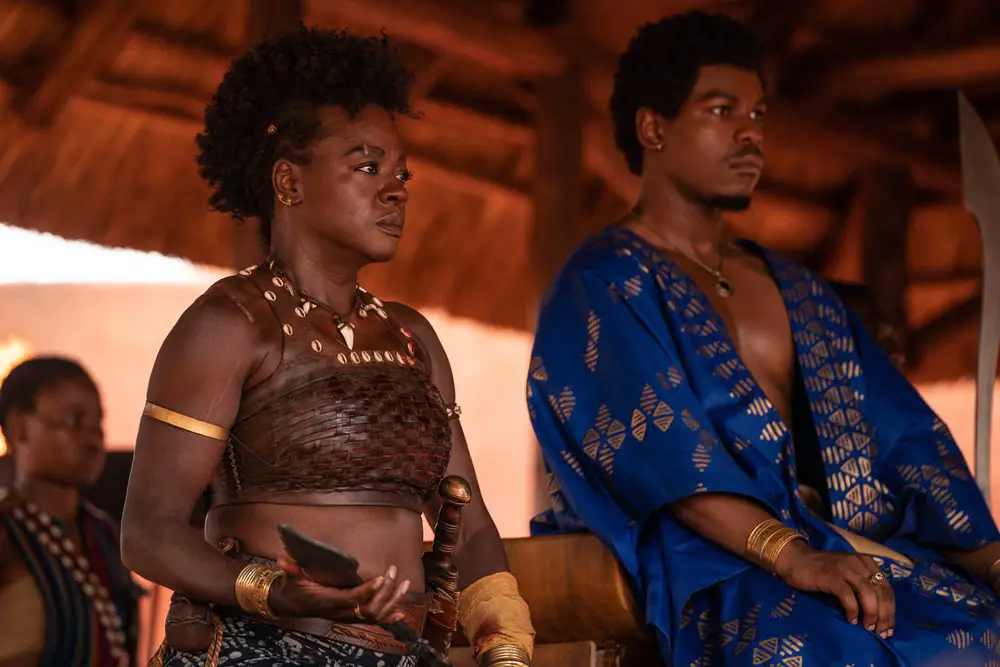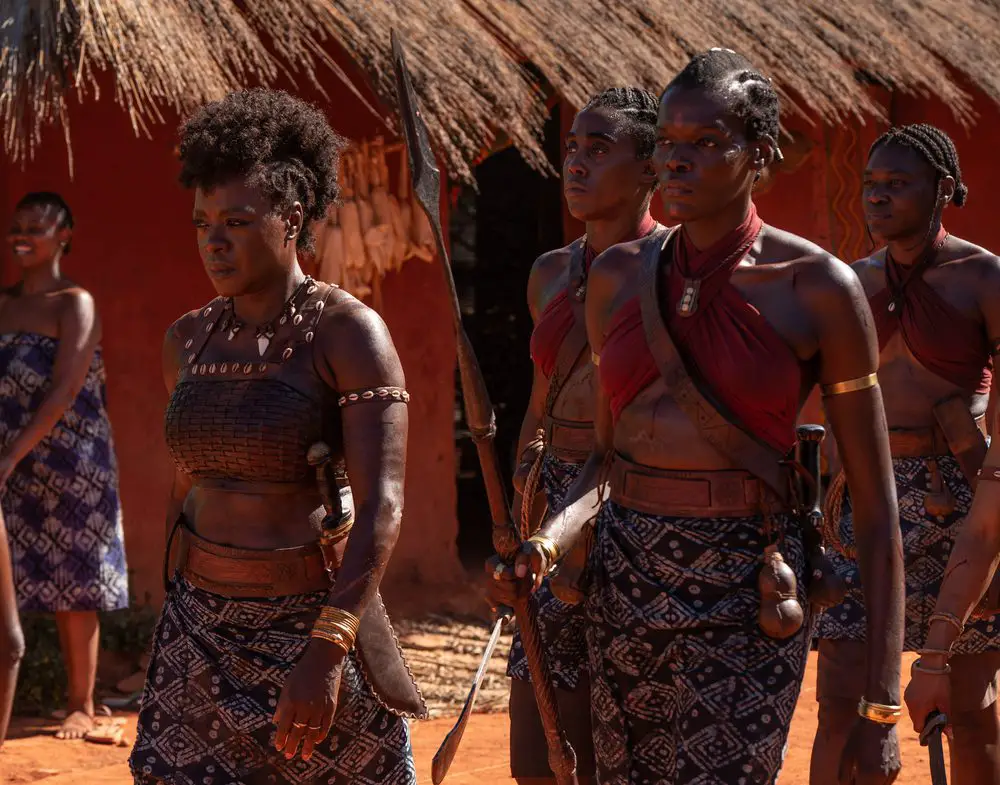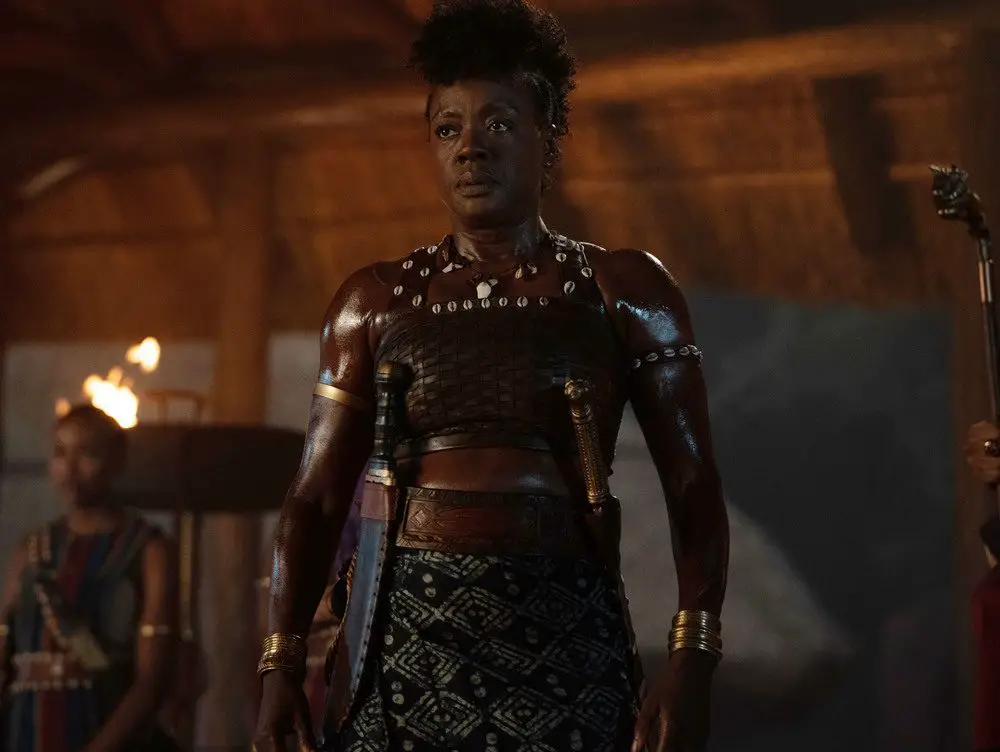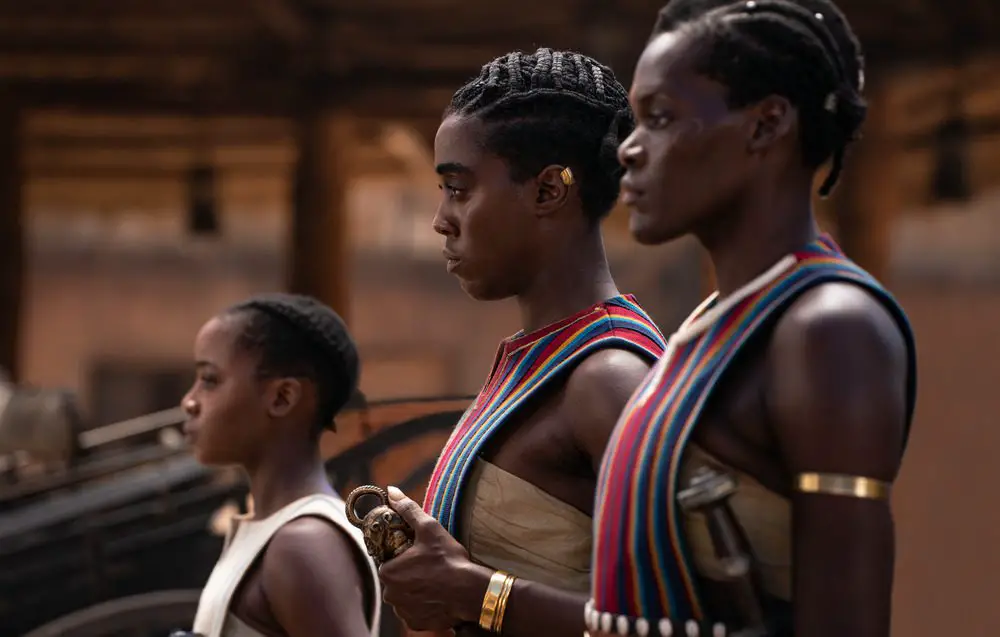Of all the subjective or objective metrics that get bandied about when rating a film, one of the more powerful traits that can make up for shortcomings is a movie’s inspirational effect. An impassioned audience with stirred emotions is very forgiving. Many large and small aspects about Gina Prince-Bythewood’s The Woman King could be debated or exposed as flaws. In the end, they will not matter. The story being told and the dedication collected to tell it carry weight greater than the art or craft.
The Woman King seeks to present the 19th century legend of the Agojie warriors from the Kingdom of Dahomey in what is now the country of Benin in West Africa. Dubbed by a white slave trader in the movie to be “the bloodiest bitches in Africa,” they were a special and feared military unit composed of thousands of woman warriors who would become a creative inspiration for the Wakandan Dora Mijae of Marvel Comics’ Black Panther. The Agojie frequently outperformed their male counterparts in combat and were held in greater reverence in the eyes of their people and outside visitors.
That citizen-level veneration is a tremendous part of their first impression in The Woman King. Seen returning victorious from a hostage rescue opening sequence, the adoring public is not allowed to look up or lock eyes with any of them as they traverse the streets of their kingdom. This slight genuflection of their upright attention comes from esteemed respect more than fear from the tales of their exploits. The people know very well who keeps them and their king safe and acknowledges such at every opportunity.
The year is 1823 and the Agojie defending their homeland are commanded by General Nanisca (Academy Award winner Viola Davis), a stern and powerful woman who has shaped hundreds of her peers into warriors and leaders. She has the regard of her educated and decadent ruler King Ghezo (Breaking’s John Boyega) as one of his potential wives. Nanisca is flanked by two top lieutenants, the spiritual Amenza (Sheila Atim of Bruised) and the dedicated Izogie (No Time to Die’s Lashana Lynch). Their most recent skirmish with the Oyo Empire, a larger clan led by the merciless Ode Ade (Jimmy Odukoya of After) willing to use firearms and horses over the simple spears, clubs, and blades of the Agojie, means more battles are coming and new recruits are needed.
One of those fresh faces is the rule-breaking teenager Nawi, played by Thuso Mbedu of Underground Railroad making her feature film debut. Her headstrong attitude to repel the arranged suitors from her father has cast Nawi out of the house into Agojie training. There, she becomes competitive and close to fellow candidates while gaining favor from Izogie and catching the disciplinary wrath of Nanisca. Meanwhile, the threat of the encroaching Oyo is coupled with newly arriving Portuguese slave traders (embodied Hero Fiennes Tiffin of After and Jordan Bolger of The Book of Boba Fett) who play both sides of the turf war.

The Dahomey region is scarred by the exploitative triangular trade of slavery and resources. Like many African tribal monarchies (and not often mentioned in your school textbooks) who warred with their neighbors and competitors, Dahomey amassed a great deal of wealth through complicit participation in the Atlantic slave trade by selling defeated rivals, prisoners, and their own derelicts overseas. It was, unfortunately, a more lucrative venture than their vast palm oil agricultural efforts. However, the ever-increasing demand for human capital from the Europeans raised tensions in the region and domestic pressure on the king.
One needs to know, as if it isn’t obvious, that much of The Woman King is fictionalized history. Knowing that upfront allows viewers to enjoy the sweeping adventure underneath. Screenwriter Dana Stevens (Fatherhood, Safe Haven) uses the frame of King Ghezo’s ruling period and his 1823 victory over the Oyo Empire as cornerstones to an epic more interested in theatrics than hard facts. The movie is not shy to show the uglier portions of the old economics and the damning acquisition of wealth and power. Still, the film could have called out the foreign colonizers more than it did.

From a content standpoint, some of the ugliness of the crude old realities is scrubbed clean. Also, in order to secure a profitable PG-13 rating, bursting blood stays in the veins of those bodies hacked and slashed by deadly steel. Those efforts undercut a visceral honesty and a level of proper brutality that could have hardened The Woman King stronger without sacrificing inspirational impact. In a way, the film is a shade too long for those who want the action and bloodshed more than anything else, and, even when they get it, it’s weakened.
The bulky middle act of The Woman King is spent on the growth arc of Nawi and the entire kingdom’s posturing for dual-pronged conflict. The Agojie adhere to a code where, unlike other positions for women, they are paid and their opinions are heard as long as they take no husband, have no children, and swear to fight or die. The Woman King is steeped in fascinating ritual demonstration of many of these essential tenets, allowing the many actresses in the ensemble to show off their physicality alongside the inspiring emotional expressions of being powerful women.

Closer to 60 than 50, Viola Davis is a titan of screen presence and a thunderstorm of resolve in the leading role. Looking at the list of fellow 57-year-old actors, one would be hard-pressed to find a star willing to throw down the way she does in The Woman King. If Viola is the rocky exterior, then Lashana Lynch is core of crystals inside. Her conveyance of loyalty, courage, and kinship, especially to Mbedu’s main rookie, make her the heart and soul of the whole movie. She’s going to make new fans from this movie.
Surrounding them are dozens more gifted performers of glistening sinew wielding violence and indomitable spirit in equal measures. Come fight time, the stunt and fight coordinator team of Grant Powell (The Mauritanian), Daniel Hernandez (The Gray Man), and Johnny Gao (The Old Guard) outdid themselves. Together, they composed some of the best melee scenes of recent memory, mixing weapons and techniques of all sorts, sizes, and speeds.

Director Gina Prince-Bythewood saw to the effort to employ as many female under-the-line creators and department heads as possible, from the cinematographer and editor all the way down to the production assistants and drivers. Putting representation where it belonged resulted in a rich and unique overall look utilizing minimal digital effects. Some of the standout efforts include the fabulous costume work of Gersha Phillips (Star Trek: Discovery), the enveloping cinematography of Polly Morgan (A Quiet Place II), and the intricate choreography of Zoyi Lindiwe Muendane. The thematic cherry on top for The Woman King comes from an often lush score from Spike Lee’s jazz maestro Terence Blanchard.
The film’s rousing quote of “You are powerful, more than you even know” conveys a message for women not to give their power away to mistakes, poor choices, an oppressor, or a man. It was followed by the edict of “Relentlessly, we will fight.” That is a pillar worth getting behind for the target demographic welcoming this movie. That very liberating aspect may be the most inspiring quality of all about The Woman King. Seeing these women in front of and behind the camera seize this opportunity to tell a little-known history of deep heroics is beyond valuable. Every impressionable young woman who exits this movie empowered and engaged is a victory greater than any box office dollar.




